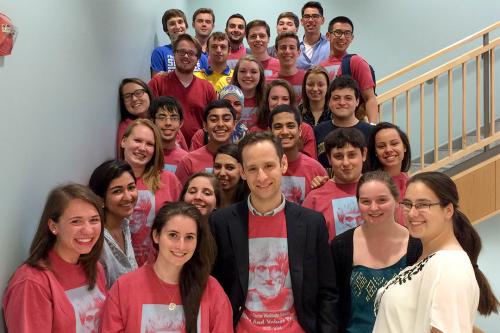Politics & Values Program
Politics & Values (P&V) is an immersive living and learning opportunity offered to a select group of first-year students. Over the course of the academic year, participants live together in Hensley Hall on GW’s Mount Vernon Campus and complete a two-semester intensive curriculum that engages in questions around our relationship to society, individual choice and shared international values.
P&V students develop leadership skills, motivate each other and become familiar with the foundational areas of political science.
Since the P&V program was founded in 1973, graduates have gone on to positions in the U.S. Senate and the House; worked in nonprofits including the American Enterprise Institute, Teach for America, AmeriCorps and the Peace Corps; and attended top graduate schools such as Harvard, Columbia, Chicago and Oxford.
How to Apply
Interested students should indicate their interest in Politics & Values when applying to GW. Exceptional students will be admitted by the GW Admissions Office during the GW application process. If you have questions about this unique program, please contact ericgryn![]() gwu [dot] edu (Professor Eric Grynaviski).
gwu [dot] edu (Professor Eric Grynaviski).
Course Details
- Structure
The program encourages vigorous intellectual development and discussion in a small-class environment. Classwork engages solely with primary texts, from ancient Greece to the present day (including works by several Nobel Prize winners), with significant faculty interaction to guide students through interpreting these difficult works. Classes meet three times per week in the fall and two times a week in the spring.
- Curriculum
Authors covered include John Locke, James Madison, John Rawls, David Mayhew, Thucydides, Kenneth Waltz, and more. Students apply these authors’ theoretical ideas to contemporary problems.
Fall Semester
Students examine the role of values like rights, responsibilities and liberties in the founding of the United States, through the lens of the classic texts that the Founding Fathers read. Then the curriculum moves on to study modern political scientists' skepticism about the promotion of values, asking what made some skeptical about the values that the Founders believed were at the core of American politics.
Spring Semester
Content focuses on the connection of values with cultures and nations; the problems of national and ethnic violence; traditional political science theories about the causes of war; the religious, moral and political origins of the current conflict between the West and Islam; international attempts to curb violence and establish boundary-crossing values; and the values that underlie our efforts to encourage development in impoverished areas of the world.
- Writing Requirements
Politics & Values is writing intensive, in part to fulfill the Writing in the Disciplines (WID) requirements of the spring portion of the course. Participating students complete writing assignments appropriate to this requirement.
- Earning Credit
Politics & Values (PSC 1011 and 1012W) satisfies all three prerequisites for a Political Science major in the Columbian College (PSC 1001, 1002 and 1003), as well as fulfilling a political theory requirement and a WID requirement. For the PSC minor, P&V fulfills 12 of 18 required credits, including the intro (1000 level course) and Group E requirement.
For students in the Elliott School of International Affairs, Politics & Values will fulfill all the introductory Political Science courses (PSC 1001, 1002, and 1003), the "One Additional Humanities or Creative Arts" requirement, and a WID. As the course fulfills PSC 1003 (International Relations), students are exempt from taking Introduction to International Affairs. The P&V professor will remain in contact with your Elliott advisor and can be available to help answer questions regarding Elliott School requirements.
"After writing several 15-page papers for Politics & Values, writing for other classes seems easy. The feedback and personalized attention I received enabled me to write successful papers in other classes, like archaeology and women's studies."
Michael Lundholm
BA '15
Networking and Professional Development
P&V students are exposed to many opportunities to meet important contacts in the field:
- Alumni speaker events: Students meet visiting alumni who come to share their experiences and advice. Past speakers have included college professors, newspaper writers, successful lawyers and bankers and many others who trace their roots back to P&V.
- Washington policy community contacts: In the past, students have heard scholars from the United States Holocaust Memorial Museum speak about modern genocides, talked with high-level staffers from Congress about the educational preparation needed for a career on the Hill, visited sessions of the U.S. Supreme Court and toured the capital’s monuments to learn about the ideology behind the architecture.
- Career development seminars: After completing the program, P&V students have the exclusive opportunity to participate in seminars that connect them with members of the extended P&V family, including influential alumni across the country.
- Department research opportunities: P&V students also have access to research opportunities within the Political Science Department.


